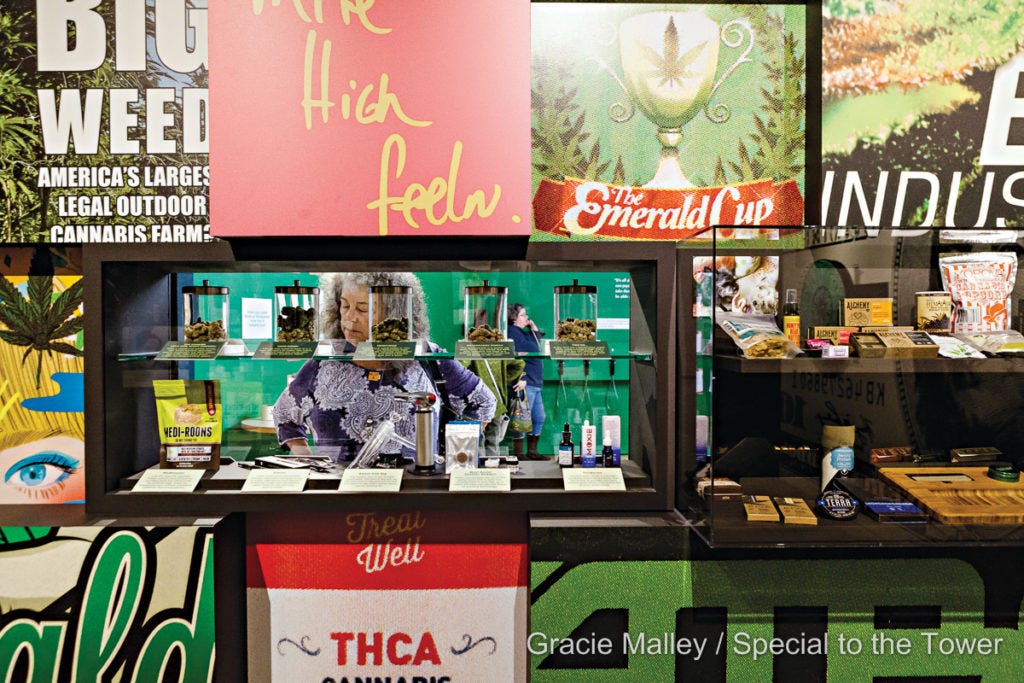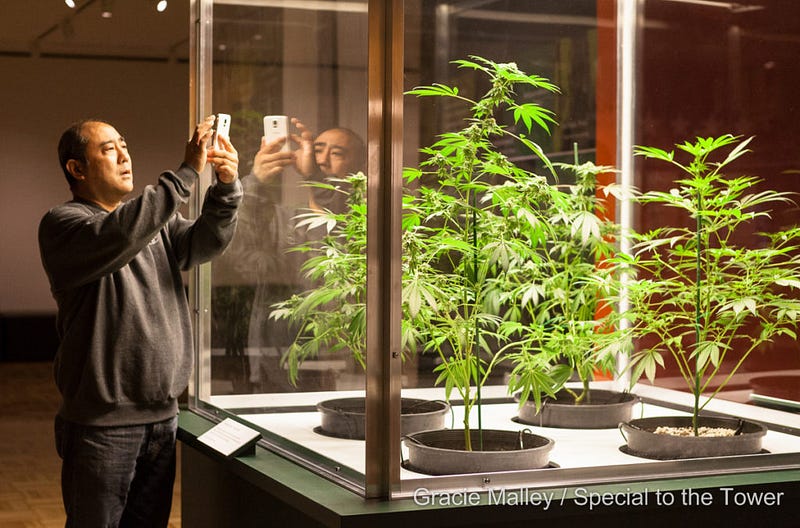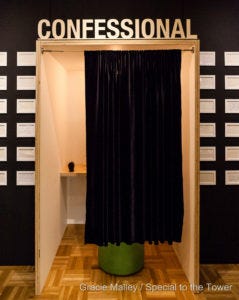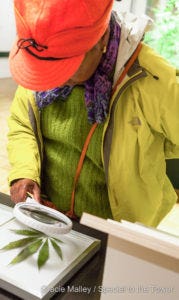
Cannabis is treated with a newfound respect in OMCA exhibit
By Sarah Carpenter
“Altered State: Marijuana in California” looks like a pot-smoking teenager’s bedroom that has been reconstructed and glorified on a museum’s walls.
Zig-Zag rolling papers, which can be purchased at almost any gas station, sit behind museum glass, along with creative bongs made by museum staff.
The tools of a pot-smoker suddenly feel like artifacts, and the famous stoner characters from television and cinema seem like a timeline of the mystique surrounding marijuana.
But what really deserves attention, besides the flair of pot paraphernalia — is data the museum has gathered that fuels educated conversation about the impact this plant has politically, socially, and medicinally.
The Oakland Museum of California describes itself as the first major museum to devote an entire exhibit to marijuana. The variety of perspectives on display in “Altered State” reveals just how provocative this plant is.
“We created ‘Altered State’ because we wanted to provide a safe place for Californians to have honest conversations about their hopes and concerns around marijuana, especially in light of the upcoming marijuana bill,” Sarah Seiter, the exhibit curator, said.

Californians will see Proposition 64 on the ballot Nov. 8, the Adult Use of Marijuana Act (AUMA).
Since its opening in April, the museum’s walls have fostered a community forum on the topic, complete with up-to-date information and research on the plant and the way it factors into the lives of Californians.
Many aspects of the exhibit actually collect and display visitor narratives and opinions. Visitors share how marijuana’s medicinal benefits have affected their lives, what they would say about it if they knew they would be kept anonymous, their experiences being caught with weed by the police.
They are asked to create a lawn sign expressing their opinion on legalization. According to Seiter, a sample of these documented forms of participation will be preserved after the exhibit closes on Sep. 25.
Many Marijuanas
In the awkward comfort provided by green bean bag chairs, guests are shown a history of public service announcements that depict pot users as hollow shells of their former selves, disappointing their families or their pets.
“Too many irresponsible people smoking already. We don’t need more. Do not make it readily available.”
This is a lawn sign created by a guest. It illustrates the basic fear surrounding legalization — that the government will be sanctioning “the use of a drug that makes you stupid,” as William Bennett said.

With those fears in the same room as facts and statistics that address the social impact of legalization, the conversation really begins.
It’s clear from the infographics wallpapering the “Criminal Dope” section that a disproportionate amount of citations are issued to minorities (a statistic corroborated by the California ACLU), even though the numbers of people using marijuana across ethnicities is about equal.
Jonathan Anabo, a Laney student of philosophy wearing an A’s hat and a pull-string backpack, was most drawn to this section of the museum. What he learned was “who gets ticketed, and how that plays a big role in the criminalization factor,” he said.
Anabo spun the “Wheel of Misfortune,” which featured different consequences for getting caught with weed. He hopes for “Overlooked at Lake Merritt” but instead he gets “Pulled over in Portland!” which amounts to a speeding ticket and no penalty for the weed.
The kid who spins after Anabo, though, gets “Lose Big in Las Vegas.” He would have to pay a $600 fine for possession of narcotics in this scenario, because marijuana is a misdemeanor in Nevada.
According to the federal government, marijuana is a Schedule 1 drug, which makes it among the most likely to be abused and most harmful drugs, with no medicinal benefits. Marijuana is the only Schedule 1 drug that California has legalized for medicinal use since Proposition 215 passed in 1996. Oakland first passed Measure Z in 2004, which made private adult marijuana offenses the lowest police priority.

“California as a state, and Oakland specifically, have always been early adopters of marijuana policy, so this city was a great fit for the exhibition,” Seiter said.
Further serving as a platform for discussion, specifically on the topic of Prop. 64, Jorge Gonzalez of the OMCA organized the “Perspectives on Legalizing Marijuana” panel at the museum.

“It’s when we connect our content with the public. What we’re trying to do with this exhibition is create more discussion, and I think that this is a great example of how that work comes full circle,” he said.
Two legal experts well-versed in the specifics of Prop. 64, Amanda Reiman and Tsion Sunshine Lencho, spoke along with Timothy Birch of the OPD’s Research and Planning Department on the topic of what legalization would look like through Prop. 64.
Cynthia Gorney, a prominent journalist, moderated these experts in a discussion of what legalization has accomplished in other U.S. States so far. None of the panelists claimed that Prop. 64 is a perfect bill, but Reiman said “It’s gonna be a learning curve, for sure, but it’s still better than, you know, the 20,000 felony arrests we have for marijuana in California every year, because from my position that’s the most important part of legalization.”

For most marijuana activists, legalization is about more than being able to smoke without consequence.
Along the entrance to the exhibit, across from Miley Cyrus’ quote, “I think weed is the best drug on the planet,” you have former Surgeon General of the U.S. Joycelyn Elders’ quote:
“We need to lift the prohibition on marijuana …We can use our resources so much better.”
While Anabo, 23, felt his perspective was altered by the exhibit, some visitors were unchanged. Nikki Shrager, 73, didn’t learn anything she didn’t already know about pot.
Though “Altered State” is very interactive, she said, “I didn’t participate because I didn’t feel like I had to. I’m a long-time pothead.”
Whether the exhibition is changing Oakland’s perspective on pot or not, to members of the cannabis community and industry it means a lot that the exhibit even exists.

“The fact that a mainstream museum has decided to devote money, resources, and space to the subject of cannabis shows that we are that much closer to normalization, which is essential to defeating prohibition,” said Gracie Malley, from Cannabis Now magazine in Berkeley.
By erecting “Altered State”, the OMCA has taken the stance that marijuana is an important issue. Without taking a stance on legalization, it strengthens voter knowledge about the issue, making it a unique space for its community.
“The museum is really interested in becoming a forum where Oaklanders can debate and discuss issues that matter to them,” Seiter said.
“We currently have an exhibit in our temporary art gallery space called “Oakland, I Want You To Know,” which explores gentrification in West Oakland…’All Power To The People: Black Panthers at 50’ [coming October 2016] looks at the legacy of the Black Panther party in the context of current anti-racism activism.”
Sarah Carpenter is the Tower Assignments Editor. Contact her at [email protected]

























